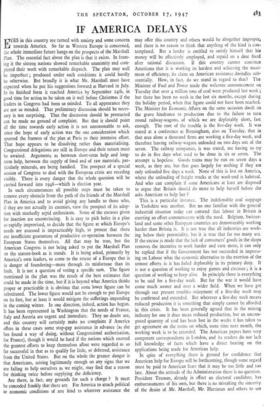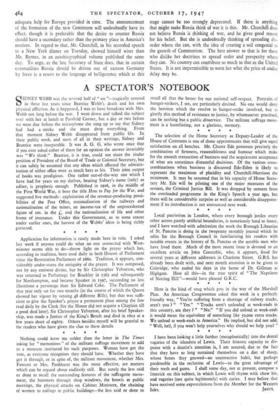IF AMERICA DELAYS
EYES in this country are turned with anxiety and some concern towards America. So far as Western Europe is concerned, the whole immediate future hangs on the prospects of the Marshall Plan. The essential fact about the plan is that it exists. In fram- ing it the sixteen nations showed remarkable unanimity and com- pleted their work with remarkable dispatch. The plan may well be imperfect ; produced under such conditions it could hardly be otherwise. But broadly it is what Mr. Marshall must have expected when he put his suggestions forward at Harvard in July. In its finished form it reached America by September 24th, in good time for action to be taken on it well before Christmas if the leaders in Congress had been so minded. To all appearance they are not so minded. That preliminary discussion should be neces- sary is not surprising. That the discussion should be protracted can be made no ground of complaint. But that it should point all the time towards early action it is not unreasonable to ask, since the hope of early action was the one consideration which spurred the framers of the plan at Paris to their intensive effort.
That hope appears to be dissolving rather than materialising.
Congressional delegations are still in Europe and their return must be awaited. Arguments as between short-term help and long- term help, between the supply of food and of raw materials, par- ticularly minerals, are being bandied. The prospect of a special session of Congress to deal with the European crisis are receding visibly. There is every danger that the whole question will be carried forward into 1948—which is election year.
In such circumstances all possible steps must be taken to remove every obstacle from the path of the friends of the Marshall Plan in America and to avoid giving any handle to those who, if they are not actually its enemies, view the prospect of its adop- tion with markedly tepid enthusiasm. Some of the excuses given for inaction are unconvincing. It is easy to pick holes in a plan so rapidly improvised, to decide that the figure at which Europe's needs are assessed is impracticably high, to protest that there are insufficient guarantees of productive co-operation between the European States themselves. All that may be true, but the American Congress is not being asked to put the Marshall Plan on the statute-book as it stands. It is being asked, primarily by America's own leaders, to come to the rescue of a Europe that is in danger of foundering—more through its misfortune than its fault. It is not a question of voting a specific sum. The figure mentioned in the plan was the result of the best estimates that could be made in the time, but if it is beyond what America thinks proper or practicable it is obvious that some lower figure can be substituted. The lower figure would not be enough to put Europe on its feet, but at least it would mitigate the sufferings impending in the coming winter. In one direction, indeed, action has begun.
It has been represented in Washington that the needs of France, Italy and Austria are urgent and immediate. They no doubt are, and this country will certainly make no complaint if America offers in these cases some stop-gap assistance in advance (as she has found a way of doing, without Congressional authorisation, for France), though it would be hard if the nations which exerted the greatest efforts to keep themselves afloat were regarded as so far successful in that as to qualify for little, or deferred, assistance from the United States. But on the whole the greater danger is that Americans, seizing legitimately enough on any signs that we are failing to help ourselves as we might, may find that a reason for thinking twice before supplying the deficiency.
Are there, in fact, any grounds for such a charge ? It must be conceded frankly that there are. For America to attach political or economic conditions of any kind to whatever assistance she may offer this country and others would be altogether improper, and there is no reason to think that anything of the kind is con- templated. But a lender is entitled to satisfy himself that his money will be effectively employed, and repaid on a date fixed after rational discussion. If this country cannot convince Americans that it is working its hardest and achieving the maxi- mum of efficiency, its claim on American assistance dwindles sub- stantially. How, in fact, do we stand in regard to that? The Minister of Fuel and Power made the welcome announcement on Tuesday that over 4 million tons of coal were produced last week ; but there has been no week in the last six months, except during the holiday period, when that figure could not have been reached. The Minister for Economic Affairs on the same occasion dwelt on the grave hindrance to production due to the failure to turn round railway-wagons, of which we are deplorably short, fast enough. The root of the trouble is the five-day week. It was stated at a conference at Birmingham, also on Tuesday, that in that area alone a thousand firms are working a five-day week, and therefore leaving railway-wagons unloaded on two days out of the seven. The railway companies, is was stated, are having to try to do in five days what used to be done in six or seven. The attempt is hopeless. Goods trains may be run on seven days a week, as they are, but that goes largely for nothing if they are only unloaded five days a week. None of this is lost on America, where the unloading of freight trucks at the week-end is habitual. And who can complain if some Americans at least are disposed to argue that Britain should do more to help herself before she asks American to help her ?
This is a particular instance. The indefensible coal stoppage in Yorkshire was another. But no one familiar with the general industrial situation today can contend that labour in Britain is exerting an effort commensurate with the need. Belgium, Switzer- land and some other European countries are demonstrably working harder than Britain is. It is not true that all industries are work- ing below their potentiality, but it is true that far too many are. If the excuse is made that the lack of consumers' goods in the shops removes the incentive to work harder and earn more, it can only be replied that if the Government has not succeeded in impress- ing on Labour what the economic alternative to the exertion of the utmost efforts is it has failed deplorably in its primary duty. It is not a question of working to enjoy games and circuses ; it is a question of working to keep alive. In principle there is everything to be said for a five-day week. But for the war it would have come much sooner and over a wider field. When we have got through our present troubles enjoyment of a five-day week may be confirmed and extended. But wherever a five-day week means reduced production it is something that simply cannot be afforded in this crisis. It has been generally agreed that in the mining industry for one it does mean reduced production, but an uncom- puted quantity of coal has been lost in the weeks it has taken to get agreement on the terms on which, some time next month, the working week is to be extended. The American papers have very competent correspondents in London, and its readers do not lack full knowledge of facts which have a direct bearing on the applications being made for American help.
In spite of everything there is ground for confidence that American help for Europe will be forthcoming, though some regard must be paid to American fears that it may be too little and too late. About the attitude of the Administration there is no question.
President Truman, already in effect an electoral candidate, has embarrassments of his own, but there is no mistaking the sincerity of the desire of Mr. Marshall, Mr. Harriman and others to see adequate help for Europe provided in time. The announcement of the formation of the new Comintern will undoubtedly have its effect, though it is preferable that the desire to counter Russia should have a secondary rather than the primary place in America's motives. In regard to that, Mr. Churchill, in his recorded speech to a New York dinner on Tuesday, showed himself wiser than Mr. Byrnes, in an autobiographical volume published the same day. To urge, as the late Secretary of State does, that in certain eventualities Russia should be driven out of eastern Germany by force is a resort to the language of belligerence which at this stage cannot be too strongly deprecated. If there is anything that might make Russia think of war it is this. Mr. Churchill does not believe Russia is thinking of war, and he gives good reason for his belief. But she is undoubtedly thinking of spreading dis- order where she can, with the idea of creating a soil congenial to the growth of Communism. The best answer to that is for those who dislike her doctrines to spread order and prosperity where they can. No country can contribute so much to that as the United States. It is not impermissible to warn her what the price of undue delay may be.



































 Previous page
Previous page